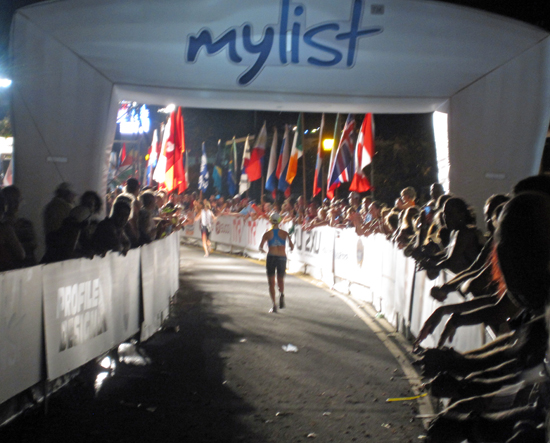
Saturday, Oct. 13, 2012. I had the opportunity to be a lifeguard for the 2.4 mile ocean swim, which was the first event at the Kona, Hawaii Ironman World Championships. After completing the swim the competitors get on their bikes and ride 112 miles. The temperatures can exceed 110 degrees on the highway and the crosswinds can be more than 25 miles per hour. Finally, the bikes are traded for a pair of shoes and a 26.2 mile marathon is completed to bring the finishers back to the celebration in the town of Kailua-Kona, on the Big Island of Hawaii.
Who would be crazy enough to do this? The answer is nearly 2,000 participants, professionals and amateurs. They come from 60 countries and all 50 states. They range in age from 19 to 82. And all of them won his or her invitation to the Kona Ironman through competitive qualification at other Ironman events, which is a testament to the level of dedication. In fact, there are more than 100,000 people who compete worldwide annually in other Ironman events to try to qualify for selection as Kona Ironman competitors.
The 150 professional athletes, both men and women, finish the competition in less than 10 hours and are truly amazing examples of human performance. These athletes have my greatest respect and admiration, but I was most emotionally moved by the stories of the nearly 1,800 non-professionals who accomplished the feat of being called "Kona Ironmen." The professionals started at 6:30 a.m. and finished before 3 p.m., but among the non-professionals, some finished just before the cutoff at midnight and had been on the course for nearly 17 hours. Their stories were told by the families and friends who waited patiently for the arrival of their "Ironman" to finish.

By midnight the town is quiet. Victory parties for the earlier finishers are underway. The roads through town and the highway are slowly reopened as the course is cleaned up for the next day's return to life as usual. But for everyone still gathered at the end of the course, we wait. And then out of the quiet and into the bright lights of the finish area come the courageous "Ironmen" completing their successful journeys of dedication, through physical pain and doubt about whether they will make it in time. Crossing the finish line at the late hours were numerous personal stories of champions: the 81-year-old man completing his third Ironman, the 43-year-old woman with a prosthetic left leg, the 54-year-old woman who triumphed over breast cancer, and the men running together to raise money for ALS research in memory of their father. Each of them was greeted with tears by a personal "support team" who had been cheering them on at various places along the course for the nearly 17-hour day.
As I stood there feeling the emotion coming across the line with each of these late finishers, I was reminded of how the path to success in life for all of us requires advocacy, perseverance, and determination at times of adversity. There is probably no place where this is more obvious than when we are confronted with a major health challenge: the diagnosis of diabetes, cancer, arthritis, or an event like a heart attack. What do we do in when confronted with these challenges? For each of us it is a personal test not unlike the late finishers at the Kona Ironman competition. Most people are not "professionals" in managing our disease. We have to learn what to do, find a coach or support team, practice the right things, and dedicate ourselves to endure through the hard times even when we want to quit. The challenge of fighting a disease is that we are not sure where the finish line is, and therefore at times the competition can seem endless.
As I listened to the stories of the Ironmen late on Saturday night, I recognized that many of them had the same feeling during some period of the race -- a point at which they felt that the finish was too far away and unachievable. Somehow they kept pushing forward through the "wall" of both the physical and mental resistance of the body and the mind.
Amazingly, of the nearly 2,000 competitors in the Kona Ironman more than 90 percent successfully completed the 141 miles of the swim, bike and run challenge. The "secret sauce" that allows this exciting outcome to occur is made up of personal dedication and commitment, undaunted courage, amazing support systems with family and friends, a supportive professional structure related to the race organizers, and the sustained positive reinforcement of the thousands of people along the course who encourage each participant to reach the finish line.
As I stood there in the awe of every successful "Ironman" at the midnight completion of the day's activities, with Hawaiian drums beating and a prayer in Hawaiian for all the day's competitors being sung, I realized that the environment that resulted in success for these competitors contains the same characteristics that could create a successful health care system. If our society would embrace a system focused on health advocacy and lifestyle medicine, it would reflect the same level dedication of those who train for the Ironman competition.
As I walked back to my room at the close of the Ironman I was deeply struck at how much I had learned about the interconnection among our physical and spiritual worlds and how they can combine to result in successful outcomes against adversity that celebrates the most precious aspects of being human. I will take this Kona Ironman experience into my continued commitment to both my own health and that of the many people I have the privilege of interacting with as a health professional.
Dr. Jeffrey Bland is president of the Personalized Lifestyle Medicine Institute in Seattle. Learn more at www.plminstitute.org
For more by Jeffrey Bland, Ph.D, click here.
For more on fitness and exercise, click here.